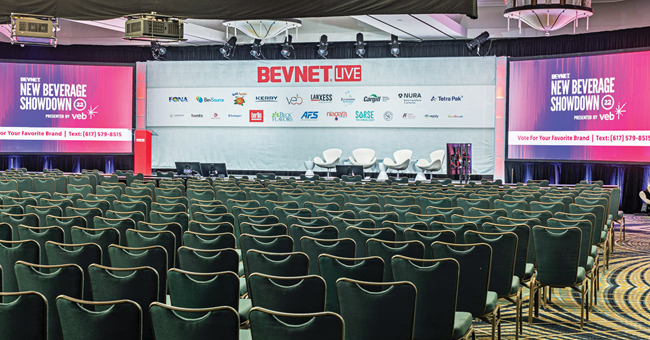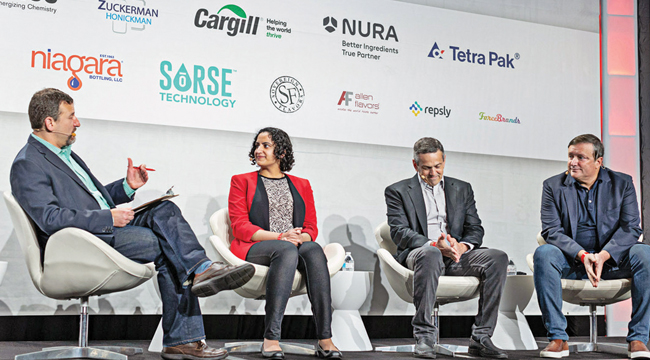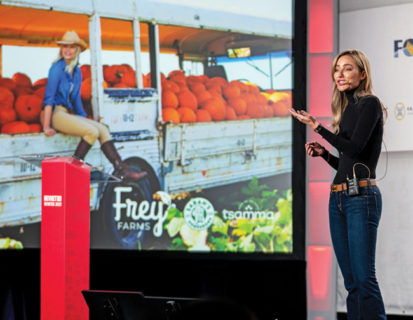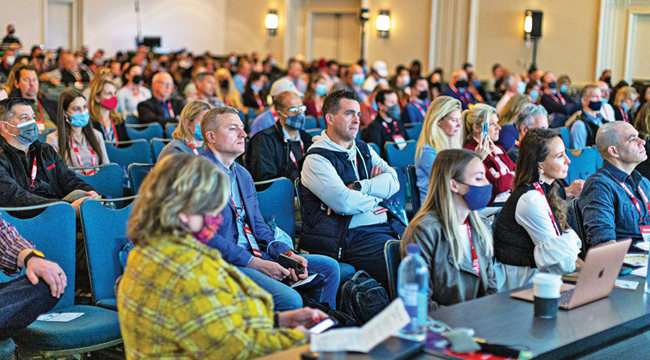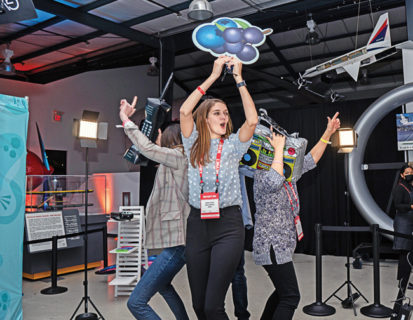BevNET Live Winter 2021 Recap
After a two year wait, BevNET Live Winter 2021 returned in December in Santa Monica, Calif. with a full slate of programming looking at how the beverage industry is moving ahead amid changes from the pandemic, increased participation from celebrity investors, rising health and sustainability trends and the impact of ecommerce and internet market.
On December 6, the two-day event kicked off with a panel bringing together a range of experienced experts and operators to more closely examine the current state of the beverage business, taking into account the disruptive conditions of the last two years.
For investors like Mark Rampolla, founder of ZICO and co-founder and managing partner at PowerPlant Ventures, the ability of beverage startup founders and their teams to be prepared to tackle problems and “ride out” difficult periods has become a critical asset. “More than ever, we are looking for founders and teams,” he said, that can handle the “unbelievably complex” business environment. However, those that do manage to emerge from the early growth stage may find themselves with an “open field” to continue scaling, as many will not.
The widely reported issues related to supply chain gridlock, material shortages and labor scarcity have recalibrated the metrics used to evaluate a brand’s progress, according to Nick Giannuzzi, managing partner at The Giannuzzi Group. “These are brand new issues,” he said, but at the same time there is “more money, more creativity, more great ideas” circulating through the industry, and that judging brands strictly on their performance during the pandemic is missing the bigger picture of what they bring to the table.
Along with leadership, the panelists noted that profitability is another key focus within the beverage business, which arguably wasn’t the case several years ago. Nicole Dawes, CEO and founder of Nixie Sparkling Water, implored entrepreneurs to prioritize “building a solid business” that is profitable, while Brian Barr, account executive at DPI Specialty Foods, emphasized the importance of setting long-term and short-term goals. With so many brands competing for space, Barr said trends like immunity and functional drinks have seen particular rise in consumer interest.
Speaking from his experience in guiding the brand for a decade, Eddie Simeon, co-Founder and CMO of Hella Cocktail Co., made the case for growing slowly (and profitably) rather than chasing riskier bets for short-term gain. Reflecting on her own long journey in building snack brand Late July before launching Nixie, Dawes noted how core values and beliefs can help guide companies through fallow periods.
“When you are an organic brand or doing other things that require more capital, you have to be realistic about that and know it’s part of your mission and part of who you are, and build that in,” she told the audience at the Loews Santa Monica Hotel.
Also on day one of BevNET Live Winter 2021, Sarah Frey, CEO of Frey Farms, discussed her personal journey in building an agricultural power brand, and how initial setbacks and challenges influenced her approach to brand building, negotiating with partners and building an effective team.
As well, a presentation by Nik Sharma, CEO of Sharma Brands, focused on how beverage brands can grow smart in D2C and arm themselves with the right knowledge and tactics as they scale. Stepping outside the strictly beverage space, BevNET editor-in-chief Jeff Klineman sat down with founder/investor Shaun Neff (Neff, Orro, Sun Bum, Pattern, Beis, Moon, and Beach House) to break down effective ways to work with celebrities and influencers to create awareness and gain attention organically, and how engaging brands can distinguish themselves within crowded categories.
Day two of the event kicked off with another look at how the industry has changed since 2020, this time with a panel featuring members of The Coca-Cola Company’s New Revenue Streams group.
Daniel White, Chief of New Revenue Streams at Coke, described how Coke has shifted its core focus away from “Brands” and towards “Businesses” over the past two years. Until recently, Coke’s Venturing and Emerging Brands (VEB) unit had been focused on “finding the next billion dollar brand,” but today that idea is outdated and the industry has room for a broader array of companies to meet a larger, more diverse beverage market.
“Today it’s about finding the right model for the right brand,” White said, describing the new way of thinking as a transition from venture capital (i.e. investing and scaling brands) to private equity, where each brand and category needs to be met on its own terms.
Turning to Coke’s immediate interests, White highlighted five new revenue streams the company is focused on, including alcoholic drinks, the Topo Chico brand, coffee, mixers, and new packaging formats built around home use.
“The world is more open than ever, whether we like it or not,” he said. “Closed systems are difficult to build and difficult to protect.”
In regards to alcohol, White said that Coke is entering the space carefully, but at the same time very little is off the table — including potential line extensions from core brands. Though it didn’t come up during the panel, the move would follow in the path of PepsiCo, which announced this year it has partnered with Boston Beer Company for the launch of a Hard MTN Dew line.
Other highlights from the second day included Cliff Morgan, founder and CEO of G Fuel, who sat down to discuss how he built a thriving energy drink brand by honing in on the gaming community and a pandel with Nutpods CEO Madeline Haydon and United Sodas of America CEO Marisa Zupan, who both started their businesses as direct-to-consumer brands, and talked about the need to make the leap to brick-and-mortar retail and how they approached becoming omnichannel companies.
The second day started to wind down with Brian Kelly, the chairman and CEO of PearlRock Partners, who delivered a presentation drawing from his experiences scaling Keurig to share how beverage brands can best meet the demands of their investors, their retailers and their consumers.
Finally, the conference concluded with a panel looking towards the future of beverage investment, featuring Redbud Brands founder Brian Goldberg, Supply Change Capital managing partner Noramay Cadena and Cambridge SPG managing partner and COO Filipp Chebotarev. The trio dove into the current trends in financing and where valuations and deal-making are headed in the near future.


Receive your free magazine!
Join thousands of other food and beverage professionals who utilize BevNET Magazine to stay up-to-date on current trends and news within the food and beverage world.
Receive your free copy of the magazine 6x per year in digital or print and utilize insights on consumer behavior, brand growth, category volume, and trend forecasting.
Subscribe